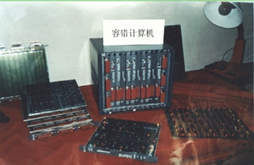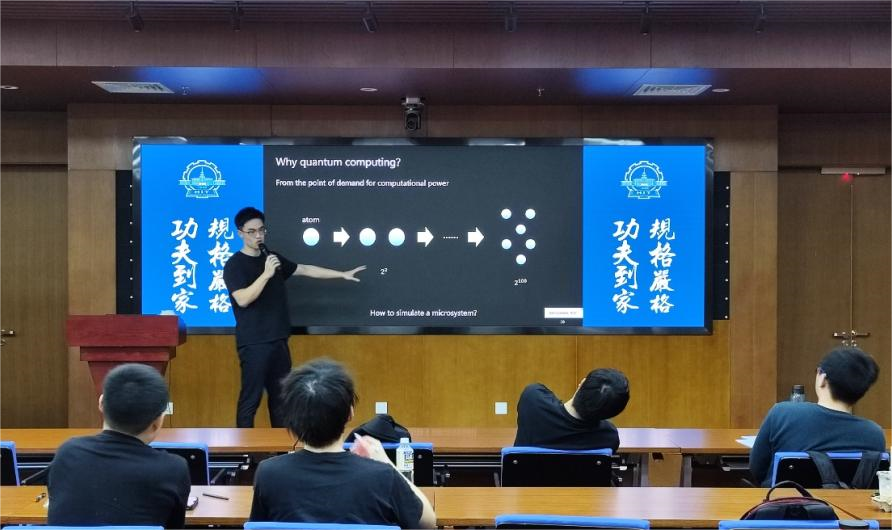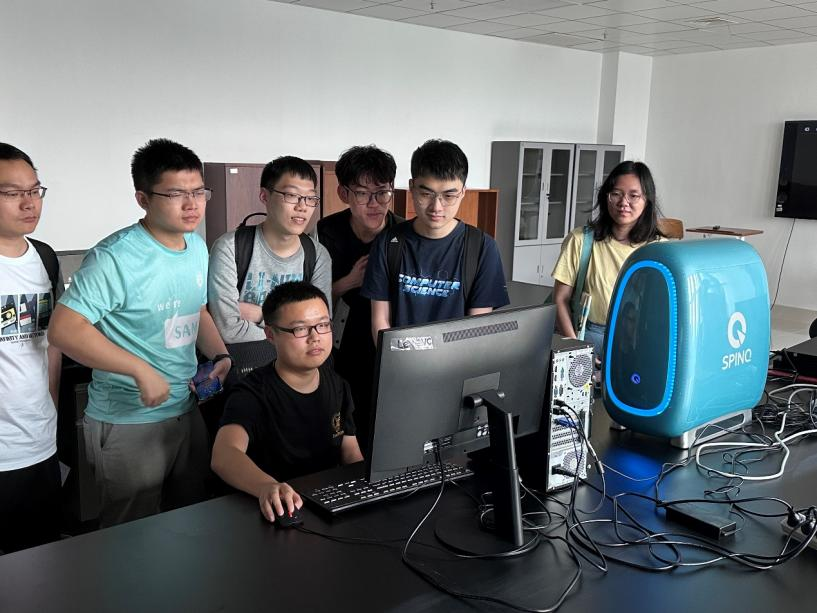Harbin Institute of Technology,Shenzhen: Theoretical Teaching+Experiments,BreakingThrough the Quantum Education Barrier
2023.11.03 · Press Release quantum computerquantum computingquantum error correction
The swift advancement of quantum computing technology, coupled with significant investments, has revealed a professional resource gap in the field of quantum computing. Cultivating talents with a solid theoretical foundation and comprehensive technical skills is essential to bridge this gap and foster industry growth. Harbin Institute of Technology (Shenzhen) [hereinafter referred to as HITSZ] has taken pioneering steps in nurturing quantum information theory talents. Through SpinQ's educational quantum computers, HITSZ has introduced the tangible experience of quantum computation hardware to its students and those across Shenzhen's university city, effectively promoting the development of quantum computation in academia and research.
Scarcity of Experimental Equipment and Lesson Plan Resources:
The Challenge of "Theoretical-only" Quantum Education
Quantum computing has garnered considerable attention for its superior computational power over classical computing in solving specific problems. From Guangdong Province's "Zhuo Yue" program to the national "14th Five-Year Plan," quantum computing has been earmarked as a key R&D direction, with Shenzhen designating quantum information as one of its eight future industries.
Harbin Institute of Technology boasts a long-standing legacy in fault-tolerant quantum computing, with the first "RCJ-1" computer launched in 1979. HIT has since expanded its research into quantum information, achieving significant results in fault-tolerant quantum computing and quantum-encrypted communication.

China's First Fault-Tolerant Computer "RCJ-1"
While deeply engaged in scientific research, HITSZ has not overlooked the cultivation of quantum information talents. As one of the first institutions to join the national "211 Project" and "985 Project," HITSZ is committed to aligning with major national strategies and fostering talents in quantum information—a mission that HITSZ has consistently pursued.
From May to July 2022, HITSZ successfully held the first quantum information interest course. The course started from the zero base, focusing on important basic theories related to quantum information, and provided systematic introductory guidance for students interested in quantum information. The class is open to all undergraduate and graduate students in Shenzhen University City, aiming to explore and cultivate more talents in the field of quantum information, which reflects the open and inclusive mentality of HITSZ in the development of the discipline.
However, the theoretical knowledge of quantum information courses is voluminous and difficult, and many counter-intuitive quantum effects are difficult to experience realistically on classical computers or quantum simulators. If there is a lack of relevant experimental equipment and practical sessions, it is not possible for students to have an intuitive understanding and in-depth experience of quantum technology, and students' enthusiasm for exploring knowledge can only be kept on the written page. Secondly, the resources for quantum computing lesson plans are scarce, and many basic quantum algorithms need to be demonstrated on a real machine to obtain sufficient teaching effects.
The lack of teaching aids and lesson plans has built a wall around the effectiveness of the lectures. If we don't cross this wall, students can only "talk on paper" about the theoretical knowledge inside the wall, and can't see or touch the real quantum computing world outside the wall.
Building a Door to the Real Quantum Computing World
To enable students to enter the real quantum world, HITSZ cooperated with SpinQ and introduced theeducation-grade quantum computer, SPINQ Triangulum, addressing the hardware deficit in quantum computing courses. SPINQ Triangulum is a 3-qubit desktop NMR quantum computer, which provides a complete set of solutions for quantum computing teaching and demonstration. It can implement any quantum algorithm with 3 qubits, supports users to write quantum computing programs freely, and has a pulse sequence editing function at the open physical hardware level. Cost-effective, maintenance-free, and highly stable, it is an ideal tool for teaching and learning.
In April 2023, the second phase of the Quantum Information Interest Class, which was put into use in conjunction with the SPINQ Triangulum, benefited more than 20 students from HITSZ, Tsinghua University Graduate School (Shenzhen), and Peking University Shenzhen Graduate School in Shenzhen University Town. The introduction of the SPINQ Triangulum in the interest class is a move by HITSZ to cut the wall and build the door, opening up the students' vision of the quantum world. SpinQ not only provides perfect after-sales debugging service support but also completes the co-teaching work of the interest class with HITSZ.

Section II: Quantum Information Class at HITSZ
With the SPINQ Triangulum, instructors demonstrated quantum concepts to students, including superposition, entanglement, quantum gates, state preparation, and renowned quantum algorithms like Grover's, Deutsh's, and HHL's algorithms, making these counter-intuitive concepts more tangible.
For students, the SPINQ Triangulum provides insights into the mysteries of quantum computing: What does a real quantum computing device look like? How are quantum algorithms executed on a quantum computer? How do they differ from classical computers? After theoretical instruction on quantum algorithms, students independently construct quantum circuits related to these algorithms (e.g., Grover's algorithm) on quantum computers, performing modifications and debugging to deepen their theoretical understanding.
Combining theoretical teaching with real-computer experiments enriches the course's depth and stimulates students' interest and enthusiasm, effectively improving teaching efficiency and satisfaction.

Students in the class using the SPINQ Triangulum for learning
The SPINQ Triangulum effectively supports students with varying backgrounds and academic needs in quickly mastering quantum computing fundamentals and algorithm design:
· Undergraduates can, through real-machine experiments and basic theory, perform well-known quantum algorithms to deepen their understanding and consolidate their knowledge.
· Graduate students can use the SPINQ Triangulum for quantum computation projects, enriching their resumes for job-seeking.
· PhD students can optimize the SPINQ Triangulum using its open hardware-level pulse sequence editing to study higher precision quantum gates or assist in their research.
HITSZ master's students Chen Jiahan and Wang Zicheng, from the School of Computer Science and Technology, have developed an interest in quantum information and are devoted to research in the field, with intentions to pursue doctoral studies.
Exploring New School-Enterprise Cooperation Models:
Promoting the Deep Integration of Quantum Technology Industry, Academia, and Research
Wang Xuan, a professor at the School of Computer Science and Technology at HITSZ and chairman of the Shenzhen Computer Society, suggests that Shenzhen should cultivate its own quantum science and technology talents. "Now that some colleges and universities in Shenzhen have opened quantum-related courses. I think colleges and universities should start cooperating with domestic quantum enterprises from the undergraduate stage to explore the integration and co-construction of quantum information science majors."
Based on the continuation of the quantum information interest classes in conjunction with the commissioning of the SPINQ Triangulum, will be an important impetus for the construction of quantum information courses at HITSZ and even in the university city, and will even further promote the formal establishment of undergraduate professional courses in the quantum information discipline. The establishment and continuous development of the quantum information discipline will require even more practical courses, which will in turn promote the promotion and use of educational-level quantum computers, forming a virtuous circle.
In October 2022, the HITSZ - SpinQ Joint Research Centre for Quantum Information was inaugurated to promote the development of quantum technology through the deep integration of industry, academia, and research. The start-up phase of the Joint Research Centre for Quantum Information is planned to carry out a total of nine subdivided topics around quantum computation and quantum communication, such as "research on high code pitch quantum error correction codes with biased noise", "research on high-fidelity quantum gates in superconducting quantum measurement and control systems", etc. " and so on.
Schools are important carriers of talent incubation, while enterprises can fully play the role of catalysts, and school-enterprise cooperation will effectively promote the development and innovation of quantum science and technology. SpinQ will continue to help popularise quantum knowledge, explore more "user-centric" quantum education solutions, and help make quantum computing accessible to all.
Contact Us
Featured Content






